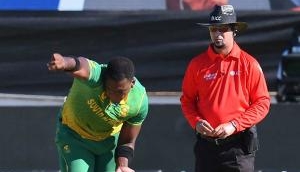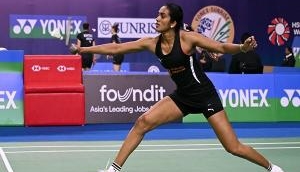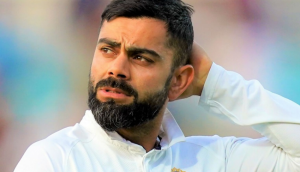Unlikely success: the Pro Kabaddi League grabbed more than just eyeballs

The numbers
- The second season of the Pro Kabaddi League has seen a 45% increase in viewers
- In the first week of this season, the online broadcast got 1.1 crore viewers - 15 times the number from last year
- Almost 90% of TV viewers are tuning in from six metro cities
The reasons
- Kabaddi is a game almost every Indian has played as a child
- People associated with the league feel it is this basic connection that has made it a hit
- The presentation quality and marketing strategy are also top-notch
What does one make of the success of the Pro Kabaddi League (PKL)? On the face of it, it makes no sense whatsoever.
A game that has never been played in formal, structured way was suddenly injected with cash, garnished with bright jerseys and placed in swanky indoor stadia instead of fields of dust.
The defining feature of the game, muttering 'kabaddi kabaddi kabaddi' or 'hu tu tu' for the entire duration of a raid, was done away with.
And yet the fans lapped it up.
This brainchild of Star Sports and Charu Sharma's Mashal Sports has taken a game that is part of India's DNA and made it 'cool'. Perhaps this why the fans love it - it's a throwback to a simpler time in their lives; it invokes memories of a romanticised past.
Mind-boggling numbers
With five days to go till the end of the second edition, PKL's viewership is 45% higher than that of the inaugural season.
None of the wave of Indian Premier League clones launched across a multitude of sports has been able to manage this - some haven't even had a second season.
It's no surprise that Star India has already announced that from next year, the league will be held twice a year, once in January-February and once in July-August.
Over the first eight days of the first edition, nearly 20.2 crore people tuned in to watch the league. To put it in context, only half that number watched the first eight days of the ICC World Cup in Australia and New Zealand this year.
On the digital front too, there has been a mind boggling increase in viewership. On starsports.com, where all matches are broadcast live, PKL amassed 7 lakh viewers last season. This season, in the first week itself, the website got 1.1 crore viewers - 15 times the number from last year.
Speaking about the success of the first edition, bigwig industrialist Anand Mahindra, one of the many high profile figures backing the league, had said: "We knew we were tapping into something that was visceral, something in our bloodstream, but to be honest, the response has shocked us."
And if you thought it was rural or semi-urban India that was driving the push for this most indigenous of games, think again. A majority of the viewers (nearly 90%) have been from the top six Indian metros - Delhi, Mumbai, Kolkata, Chennai, Hyderabad and Bengaluru.
Earthy players add to appeal
The PKL has got a lot of things right, apart from merely choosing a game which has an intimate connect with the Indian viewer.
Ronnie Screwvala, the owner of the Mumbai franchise U Mumba, believes the league owes its success to a combination of factors.
The league has taken a game that is part of India's DNA and made it 'cool'. Maybe that's why the fans love it
"Kabaddi is a short and sharp game of 40 minutes, so once you're watching it, you're hooked and not likely to change channels. It's also a very mass sport and something all of us played in some way when we were young," he said.
Star Sports's marketing push has also been smartly designed. The first season was always going to be about rediscovering the game, while the second would allow for an appreciation for the game and the players.
That's why the promos this season have been player-centric, concentrating on their individual stories of humble beginnings and making it big through the game. PKL is full of such stories, with many individuals hailing from remote parts of India.
For instance, Bengaluru Bulls' Gurpreet Singh played competitive domestic kabaddi for Punjab Police and India. From subsisting on the stipend he earned from the Punjab Police, he now earns over Rs 12 lakh over a two-month season.
Then there are stories from foreign lands as well. Believe it or not, kabaddi is played in certain circles in South Korea and Iran.
PKL features a South Korean player who went against his family's wishes to come and play competitive kabaddi in India - Dong Ju Hong. He picked up the game when he was in college in South Korea, and now plays as a defender for Dabang Delhi.
The Bachchan boost
The league features some big-name owners like Screwvala and the Future Group. But the biggest boost has been the presence of Abhishek Bachchan as a franchisee, and his father, the iconic Amitabh Bachchan, as an ambassador for the league.
Junior Bachchan's team, Jaipur Pink Panthers, won the inaugural edition of the league, while Bachchan senior has sung the catchy jingle for the second edition, 'Le Panga'. Amitabh was also invited to sing the National Anthem at the commencement of the tournament.
Credit must also go to the production quality of PKL. Before Star Sports took this up, people were skeptical about how a game like kabaddi could be jazzed up. But as Screwvala puts it: "The excellent TV coverage brings out the sport in a very smart and glossy way."
Star took a risk, and boy, aren't they glad they took it.
First published: 18 August 2015, 8:57 IST






![BJP's Kapil Mishra recreates Shankar Mahadevan’s ‘Breathless’ song to highlight Delhi pollution [WATCH] BJP's Kapil Mishra recreates Shankar Mahadevan’s ‘Breathless’ song to highlight Delhi pollution [WATCH]](https://images.catchnews.com/upload/2022/11/03/kapil-mishra_240884_300x172.png)

![Anupam Kher shares pictures of his toned body on 67th birthday [MUST SEE] Anupam Kher shares pictures of his toned body on 67th birthday [MUST SEE]](https://images.catchnews.com/upload/2022/03/07/Anupam_kher_231145_300x172.jpg)






